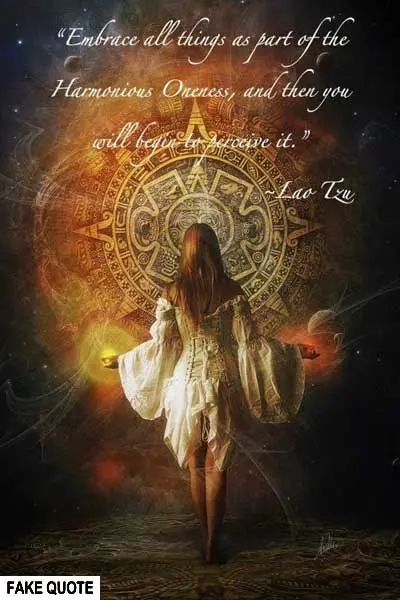|
Tao Te Ching
THE TAOISM OF LAO TZU
|
Fake Lao Tzu Quote"Embrace all things..."
This is NOT a quote from Tao Te Ching:"Embrace all things as part of the Harmonious Oneness, and then you will begin to perceive it."
If this is to be regarded as a Taoist saying, the "Harmonious Oneness" can be nothing but Tao, the Way, The expression is rather pompous and elaborate, but not completely off. Tao is definitely the one, in Lao Tzu's world, but it is modest and yielding, and that is not the spirit of this expression. Lao Tzu simply called it "the one," but he did talk about embracing it — for example in chapter 10 (my version):
Hua Hu Ching is a text claimed to be by Lao Tzu, but it is probably not older than the 4th century CE, at least 700 years after the time of Lao Tzu. Except for fragments found among the Dunhuang manuscripts discovered in 1900, it does not exist in a complete trustworthy form from historical times. The title means "Classic on Converting the Barbarians," because it was written to discredit Buddhism. It was even accompanied by the claim that Lao Tzu had gone to India after leaving China, and introduced thoughts that were later developed into Buddhism. A complete version of Hua Hu Ching in 81 chapters (like Tao Te Ching) was written by Hua-Ching Ni, first published in 1979: The Complete Works of Lao Tzu: Tao Teh Ching and Hua Hu Ching. As the title suggests, it also contains his version of Tao Te Ching. About his version of Hua Hu Ching he stated (page 105): "This one is my own education from my parents. The writing is my personal attainment." The style and content of the text are far away from the raw agitation in the fragments from Dunhuang. As for Brian Browne Walker's version of Hua Hu Ching, he mentioned with affection in the introduction that he was indebted to Hua-Ching Ni and his version of the same text. But Walker put it in poetic form, similar to Tao Te Ching, whereas Ni's version is in prose. Walker's expression "Harmonious Oneness" is in Ni's version either "Universal Way" or "Universal One." These and other differences make the texts so far apart, it is hard to see that they can be interpretations of the same classic. And of course, they are not. The chapter in question describes two paths to spiritual cultivation — one affirmative and one by denial. The quote discussed here ends the explanation of the first path. In Walker's version it reads:
His advice would not be easy to follow, since there is no complete original text of Hua Hu Ching. In any case, neither Walker nor Ni can be said to quote Lao Tzu — not by a long shot. Quotes from Hua Hu Ching are also discussed in these chapters: Do you imagine the universe is agitated, Highly evolved people, If you want to awaken all of humanity, and Most of the world's religions.
Stefan Stenudd September 14, 2020.
More Fake Lao Tzu QuotesThere are many more fake Lao Tzu quotes examined on this website. Click the header to see a list of them.
Fake interview with the authorClick the header to read a "fake" interview with Stefan Stenudd, the author of Fake Lao Tzu Quotes.
About CookiesMy Other Websites:I Ching OnlineThe 64 hexagrams of the Chinese classic I Ching and what they mean in divination. Try it online for free.
Qi Energy ExercisesThe ancient Chinese life energy qi (chi) explained, with simple instructions on how to exercise it.
Life EnergyThe many ancient and modern life force beliefs all over the world explained and compared.
Taoismen på svenska
Other Books by Stefan StenuddClick the image to see the book at Amazon (paid link).
The Greek philosophers and what they thought about cosmology, myth, and the gods. |
 Tao Te Ching
Tao Te Ching Now it's a book, too!
Now it's a book, too! Tao Quotes
Tao Quotes Cosmos of the Ancients
Cosmos of the Ancients Qi — Increase Your Life Energy
Qi — Increase Your Life Energy Aikido Principles
Aikido Principles Life Energy Encyclopedia
Life Energy Encyclopedia Archetypes of Mythology
Archetypes of Mythology Stefan Stenudd
Stefan Stenudd